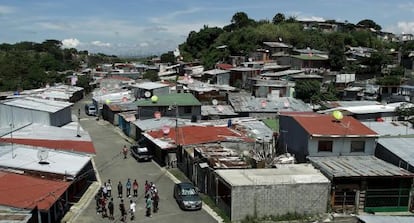Growing drug violence in Costa Rica stokes alarm among authorities
The number of trafficking-related murders has shot up in the once-safe country

For decades, Costa Rica managed to escape the drug violence that plagued its Central American neighbors. But now drug-related crimes have risen to new records across various regions, and authorities fear that gangs could be influencing the courts.
With an average of one revenge killing committed every two days – sometimes in broad daylight – and the real threat of drug trafficking organizations infiltrating some public institutions, the Costa Rican government has begun to take action to prevent these gangs from gaining control of certain territories.
One revenge killing is committed every two days in Costa Rica
Officials want to prevent a situation similar to the one that has affected Guatemala, Honduras and El Salvador.
According to statistics, the annual murder rate could reach more than 11 homicides for every 100,000 inhabitants by the end of the year.
Videos of shootings are now being posted more frequently on the social networks. In one recording, gunmen armed with AK-47s are seen firing at a victim riding inside a taxi in one of San Jose’s most peaceful city center neighborhoods.
With just a 20%-success rate in solving these apparent drug-related attacks, the Judicial Investigation Institution (OIJ) has created a special homicide unit.
The team has been equipped with an armored vehicle that can resist AK-47 bullets and is able to enter certain neighborhoods where mail-delivery employees, taxi drivers and insurance inspectors often think twice before going in, according to the police and Red Cross.
The situation has worsened since five years ago, when Costa Ricans first became aware of the rise in the numbers of murders and violent incidents. Between 2011 and 2014, authorities began to crack down – arresting important leaders of drug gangs and other criminal organizations – and the homicide rate dropped to 10 murders for every 100,000 inhabitants.
But the situation also gave rise to internal battles in the center of the country for control of territory. The number of killings increased, particularly those of mid-level drug leaders who aspired to become gang bosses, and of lawyers who defended traffickers.
One such incident took place on October 1, when unknown assailants gunned down a prominent lawyer, Roy Ching, just two kilometers from the presidential palace in downtown San Jose.
“There is no returning to the peaceful Costa Rica that was free of violence by criminal organizations,” said Attorney General Jorge Chavarría. “Costa Rica is now a violent country.”
Costa Rica now is a violent country”
Attorney General Jorge Chavarría
President Luis Guillermo Solís called together a special meeting with the judicial, congressional and other executive branch leaders to discuss making changes in the courts and among investigators.
At the same time, Costa Rica wants to reform its money-laundering laws, including allowing the government to confiscate property or goods from those who cannot prove a legal purchase.
Authorities believe that the gangs working out of Costa Rica are local organizations helping the cartels move drugs and supplies from South America to the north.
Recently, the National Liberation Party (PLN) removed its candidate in the mayoral race in Limón – a defense lawyer who takes up high-profile drug and criminal cases. The party believed it was sending a bad signal if he remained in the race.
English Edition by Martin Delfín.
Tu suscripción se está usando en otro dispositivo
¿Quieres añadir otro usuario a tu suscripción?
Si continúas leyendo en este dispositivo, no se podrá leer en el otro.
FlechaTu suscripción se está usando en otro dispositivo y solo puedes acceder a EL PAÍS desde un dispositivo a la vez.
Si quieres compartir tu cuenta, cambia tu suscripción a la modalidad Premium, así podrás añadir otro usuario. Cada uno accederá con su propia cuenta de email, lo que os permitirá personalizar vuestra experiencia en EL PAÍS.
¿Tienes una suscripción de empresa? Accede aquí para contratar más cuentas.
En el caso de no saber quién está usando tu cuenta, te recomendamos cambiar tu contraseña aquí.
Si decides continuar compartiendo tu cuenta, este mensaje se mostrará en tu dispositivo y en el de la otra persona que está usando tu cuenta de forma indefinida, afectando a tu experiencia de lectura. Puedes consultar aquí los términos y condiciones de la suscripción digital.








































